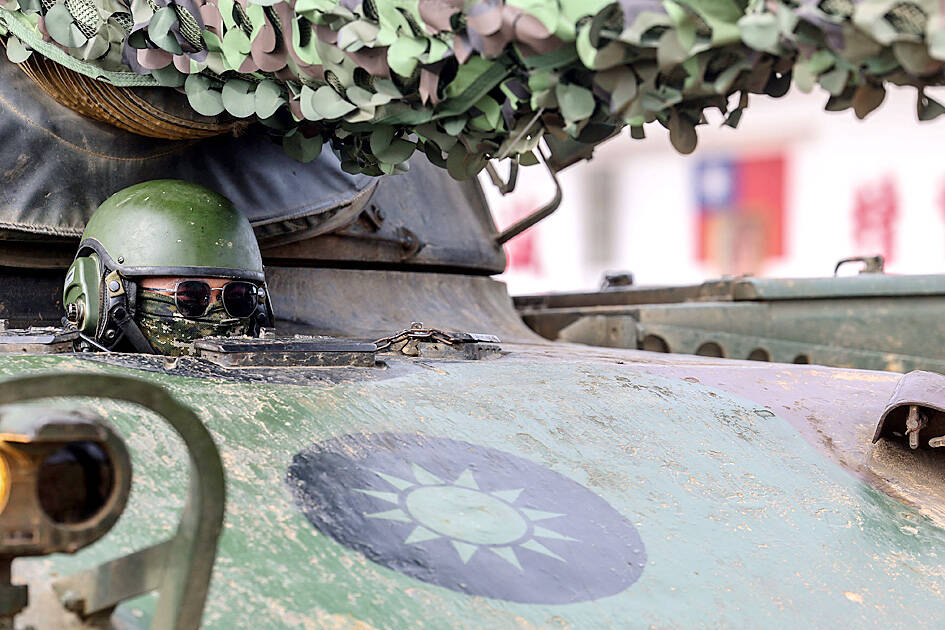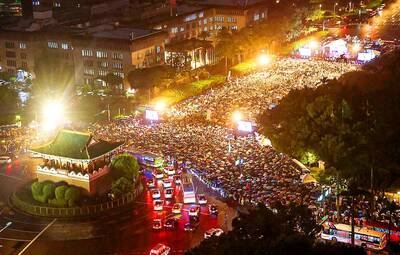Taiwan should follow Poland’s example by significantly increasing its defense budget and investing in affordable military technology such as uncrewed aerial vehicles (UAVs) to better prepare for a potential Chinese invasion, two Polish defense experts said on Wednesday.
“In Poland, we realized that we need to be less and less dependent on our allies,” Tomasz Smura said in an interview in Taipei.
Although Poland values its strong ties with its main security ally, the US, it recognizes that Washington is adjusting its global resource allocation following US President Donald Trump’s return to the White House, said Smura, director of research at the Warsaw-based think tank Casimir Pulaski Foundation.

Photo: I-hwa Cheng, AFP
Rising threats from Russia make it important for Poland to become more self-reliant in its defense, he said.
Poland’s military spending is to rise to 4.7 percent of GDP this year, said Smura, who also heads the foundation’s defense program.
He urged Taiwan to follow Poland’s example by significantly increasing its defense budget to address a similar threat from the authoritarian regime in China.
Zbigniew Pisarski, president of the foundation’s board, shared a similar view, citing Cold War-era defense spending that averaged 3 percent of GDP or higher.
“I would heavily recommend that defense spending be much higher in Taiwan,” he said.
Taiwan’s Cabinet earmarked NT$647 billion (US$21.44 billion) for defense spending this year, equal to 2.45 percent of GDP. Some of that budget was cut or frozen by the opposition-controlled legislature earlier this year.
President William Lai (賴清德) later pledged to propose a special budget to raise defense spending to 3 percent of GDP, but that plan would also need legislative approval.
Asked what kind of weapon systems Taiwan should invest in amid rising military threats from China, the Polish experts recommended more investments in UAVs — such as drones and loitering munitions — and anti-ship capabilities.
“Lessons learned from Ukraine show it’s not always necessary to spend money on advanced high-end technologies. Sometimes it’s better to have large numbers of cheaper equipment,” Smura said.
The two were part of a delegation from the foundation that wrapped up their six-day visit in Taiwan on Saturday.

The Central Weather Administration (CWA) today issued a "tsunami watch" alert after a magnitude 8.7 earthquake struck off the Kamchatka Peninsula in northeastern Russia earlier in the morning. The quake struck off the east coast of the Kamchatka Peninsula at 7:25am (Taiwan time) at a depth of about 19km, the CWA said, citing figures from the Pacific Tsunami Warning Center. The CWA's Seismological Center said preliminary assessments indicate that a tsunami could reach Taiwan's coastal areas by 1:18pm today. The CWA urged residents along the coast to stay alert and take necessary precautions as waves as high as 1m could hit the southeastern

FINAL COUNTDOWN: About 50,000 attended a pro-recall rally yesterday, while the KMT and the TPP plan to rally against the recall votes today Democracy activists, together with arts and education representatives, yesterday organized a motorcade, while thousands gathered on Ketagalan Boulevard in Taipei in the evening in support of tomorrow’s recall votes. Recall votes for 24 Chinese Nationalist Party (KMT) lawmakers and suspended Hsinchu City mayor Ann Kao (高虹安) are to be held tomorrow, while recall votes for seven other KMT lawmakers are scheduled for Aug. 23. The afternoon motorcade was led by the Spring Breeze Culture and Arts Foundation, the Tyzen Hsiao Foundation and the Friends of Lee Teng-hui Association, and was joined by delegates from the Taiwan Statebuilding Party and the Taiwan Solidarity

Instead of threatening tariffs on Taiwan-made chips, the US should try to reinforce cooperation with Taiwan on semiconductor development to take on challenges from the People’s Republic of China (PRC), a Taiwanese think tank said. The administration of US President Donald Trump has threatened to impose across-the-board import duties of 32 percent on Taiwan-made goods and levy a separate tariff on semiconductors, which Taiwan is hoping to avoid. The Research Institute for Democracy, Society, and Emerging Technology (DSET), a National Science and Technology Council think tank, said that US efforts should focus on containing China’s semiconductor rise rather than impairing Taiwan. “Without

The National Museum of Taiwan Literature is next month to hold an exhibition in Osaka, Japan, showcasing the rich and unique history of Taiwanese folklore and literature. The exhibition, which is to run from Aug. 10 to Aug. 20 at the city’s Central Public Hall, is part of the “We Taiwan” at Expo 2025 series, highlighting Taiwan’s cultural ties with the international community, National Museum of Taiwan Literature director Chen Ying-fang (陳瑩芳) said. Folklore and literature, among Taiwan’s richest cultural heritages, naturally deserve a central place in the global dialogue, Chen said. Taiwan’s folklore would be immediately apparent at the entrance of the